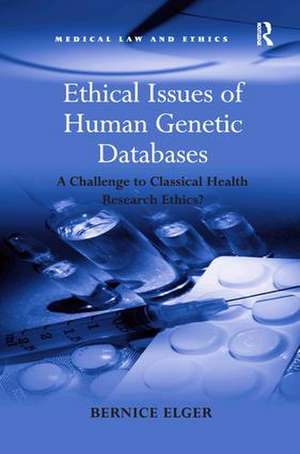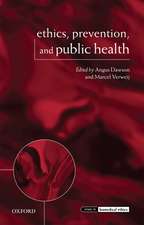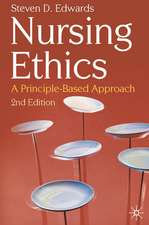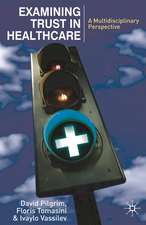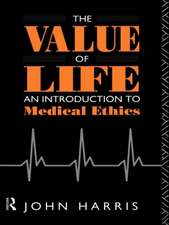Ethical Issues of Human Genetic Databases: A Challenge to Classical Health Research Ethics?: Medical Law and Ethics
Autor Bernice Elgeren Limba Engleză Paperback – 16 noi 2016
| Toate formatele și edițiile | Preț | Express |
|---|---|---|
| Paperback (1) | 324.16 lei 6-8 săpt. | |
| Taylor & Francis – 16 noi 2016 | 324.16 lei 6-8 săpt. | |
| Hardback (1) | 825.62 lei 6-8 săpt. | |
| Taylor & Francis – 28 iul 2010 | 825.62 lei 6-8 săpt. |
Din seria Medical Law and Ethics
- 13%
 Preț: 338.33 lei
Preț: 338.33 lei -
 Preț: 436.14 lei
Preț: 436.14 lei -
 Preț: 469.34 lei
Preț: 469.34 lei -
 Preț: 388.13 lei
Preț: 388.13 lei -
 Preț: 463.19 lei
Preț: 463.19 lei -
 Preț: 365.91 lei
Preț: 365.91 lei
Preț: 324.16 lei
Preț vechi: 416.92 lei
-22% Nou
Puncte Express: 486
Preț estimativ în valută:
62.03€ • 64.94$ • 51.32£
62.03€ • 64.94$ • 51.32£
Carte tipărită la comandă
Livrare economică 05-19 aprilie
Preluare comenzi: 021 569.72.76
Specificații
ISBN-13: 9781138269200
ISBN-10: 1138269204
Pagini: 332
Dimensiuni: 156 x 234 x 23 mm
Greutate: 0.45 kg
Ediția:1
Editura: Taylor & Francis
Colecția Routledge
Seria Medical Law and Ethics
Locul publicării:Oxford, United Kingdom
ISBN-10: 1138269204
Pagini: 332
Dimensiuni: 156 x 234 x 23 mm
Greutate: 0.45 kg
Ediția:1
Editura: Taylor & Francis
Colecția Routledge
Seria Medical Law and Ethics
Locul publicării:Oxford, United Kingdom
Public țintă
Postgraduate and ProfessionalCuprins
Contents: Foreword, Arthur L. Caplan; Introduction; Selected existing genetic databases: distinctive features, ethical problems and the public debate; The ethical debate: principles, values and interests - the ethical foundations of guidelines; Selected issues of consensus and of controversy; Ethical issues human genetic databases and the future; References; Index.
Notă biografică
Professor Bernice Elger teaches health law and bioethics at the Institute of Legal Medicine, University of Geneva. She is a member of an international collaboration project on ethical issues of human genetic databases, with involvement of the Department of Ethics, Trade, Human Rights and Health Law at the World Health Organization (WHO) headquarters in Geneva, a member of the subcommission who wrote the Swiss guidelines on biobanks, a member of the ethics board of @neurist, an international data and sample bank project financed by the European Commission, and a member of a Swiss working group on informed consent (Swiss Biobank).
Recenzii
'Elger splendidly describes the evolving global responses - both creative and misguided - to the ethical challenges arising in research using genetic databases and offers thoughtful suggestions for balancing the interests of science and "donors". As insightful as it is comprehensive, this book is essential reading not only for bioethicists but for anyone who uses, oversees, or simply wants to understand biobanks, which are playing an increasingly essential role in biomedical and epidemiological research.' Alexander M. Capron, University of Southern California, USA 'Bernice Elger provides a solid basis for better informed discussion on the ethical issues of genetic databases: a well structured analysis of diverse national legislation and regulation, a critical comparison of international guidelines, showing their imperfections and inconsistencies and a stimulating presentation of the ethical principles. The section on the need to embrace "solidarity" as an ethical principle to counteract the overly individualistic approach of "traditional" ethical discourse in the field of medicine and life sciences is one of the high points of the book. It should be read by researchers using genetic databases, ethicists and decision makers.' Timothy Harding, University of Geneva, Switzerland '... this book is very well researched and presents a thorough analysis of existing regulatory frameworks...' Asian Bioethics 'This book would be of high interest to clinical and scientific leaders of genetic biobank initiatives, to biobank custodians, and to members of ethical review committees overseeing operational aspects. It is essential reading for any student, or donor for that matter, interested in the ethical challenges and dilemmas that have in the past, and will continue in future, to influence research patterns and progress using these valuable resources.' New Zealand Medical Journal ’...stands out as a narrative worth reading...’ Bioethica Forum
Descriere
This book compares the new area of biobanking with the tradition of ethically accepted classical research and highlights the distinctive features of existing databases and guidelines. The volume identifies areas of consensus and controversy while investigating the challenges posed to classical health research ethics by the existence of genetic databases, analyzing the reasons for such varying guidelines. The book will be essential to academics, policy-makers and researchers in the field of medical ethics.
